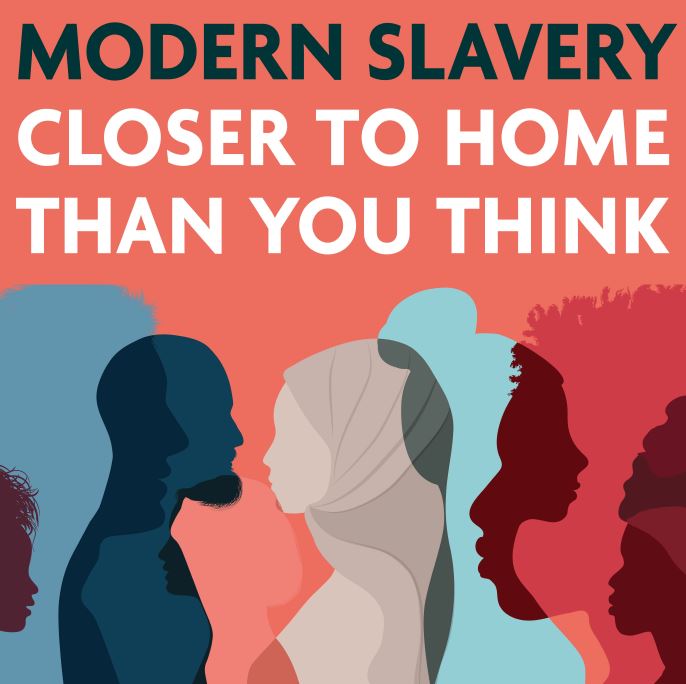What is Modern Slavery?
Modern slavery is a crime that involves the exploitation of individuals for financial or personal gain. Victims of modern slavery are often vulnerable individuals who are tricked or coerced into working in conditions that are unsafe and inhumane. They may be held against their will, forced to work long hours without pay, and subjected to physical or emotional abuse. Victims of modern slavery can be of any age, gender, or nationality. It may not always be visible and could be happening in our communities.
There are several forms of modern slavery which encompasses a range of components. These include but not limited to:
- Sexual exploitation
- Domestic servitude
- Forced labour
- Criminal exploitation
- Slavery and Servitude
- Organ harvesting
- Human Trafficking
You can learn more about Modern Slavery at Hestia: Hestia's Modern Slavery Response service/ And download Spot The Signs toolkit in the download section.
Reporting Modern Slavery
To report modern slavery, contact the Modern Day Slavery Helpline on 08000 121 700.
The UK Modern Slavery Helpline is available 24/7 to offer confidential advice and support for any victim, statutory agency, business, or member of the public regarding modern slavery suspicions or concerns.
In an emergency, call the Police on 999.
If you are concerned about a child being exploited, a referral can be made to Newham Children’s Services on 020 3373 4600 during office hours (Monday to Thursday, 9am to 5.15pm or Friday 9am to 5.00pm) 020 8430 2000 at any other time and if the referral is urgent. For concerns about adults call 02084302000 (option 2).
The National Referral Mechanism
The National Referral Mechanism (NRM) is a framework for identifying and referring potential victims of Modern Day Slavery to the Home Office to ensure they receive the appropriate protection and support.
The NRM provides a framework to identify, refer and record potential victims of modern slavery. There are five stages in identifying a potential victim and their journey through the NRM.
- Identification of a potential victim (PV)
- Referral into NRM by a first responder
- Reasonable grounds decision
- Support for victim with a positive reasonable grounds decision
- Conclusive grounds decision by a competent authority
Who can Refer?
Referrals can be made to the NRM by ‘First responders’ who are, in England and Wales, an authority that is authorised to refer a potential victim of modern slavery into the National Referral Mechanism. A list of the current statutory and non-statutory first responder organisations can be found on the government website.
If you’re a first responder working for a designated organisation, you can report modern slavery on GOV.UK.
You can still report modern slavery as a member of the public. Call the modern slavery helpline on 0800 0121 700 or report it online.
Links
Modern day slavery & human trafficking – Safeguarding resources for professionals
Domestic and sexual abuse – Safeguarding resources for professionals
Modern slavery | Metropolitan Police
How to Spot the Signs of Modern Slavery:
Unexplained Absences or Restricted Movement:
- Victims often have limited freedom of movement, may be controlled by others, and frequently appear to be accompanied by a controller.
- They may not be allowed to leave their place of work or home without supervision.
Signs of Physical Abuse:
- Victims may show visible signs of injury, such as bruises, burns, or scars, often inconsistent with their explanations.
- They might be reluctant to speak or have difficulty making eye contact due to fear of their captors.
Poor Living Conditions:
- Living conditions may be overcrowded, unclean, or substandard.
- Victims may have little to no access to personal belongings or privacy, living in shared, cramped spaces.
Inconsistent or False Identity Documents:
- Victims may not have control over their own identification documents (passports, ID cards, etc.).
- Their personal details might be inconsistent or unclear, suggesting that they have been coerced or manipulated into their current situation.
Signs of Financial Control:
- Victims might not have access to their earnings or any financial independence.
- They may be forced to work without receiving fair wages or might have their wages withheld.
Excessive Work Hours & Lack of Rest:
- Victims often work extremely long hours, with little to no time off.
- They may be expected to work under duress, and fear punishment for taking breaks or showing signs of exhaustion.
Fearful or Anxious Behaviour:
- Victims may appear fearful of their employer or others around them.
- They may avoid contact with authorities, or seem extremely nervous, especially in situations where they could be alone or in private with someone they do not trust.
Poor Communication Skills or Language Barriers:
- Victims may have limited language skills and struggle to communicate or express themselves clearly.
- They may have been isolated from their families or communities, leading to a lack of support networks.
Control of Personal Relationships:
- Victims may not be allowed to maintain relationships with family or friends.
- They might be isolated from their community or social networks, leaving them with no one to turn to for help.
Signs in Businesses or Locations:
- Businesses that may be exploiting victims often operate in industries such as construction, agriculture, hospitality, and domestic work.
- Locations may have workers with little or no pay, working excessively long hours, and living in poor conditions.

